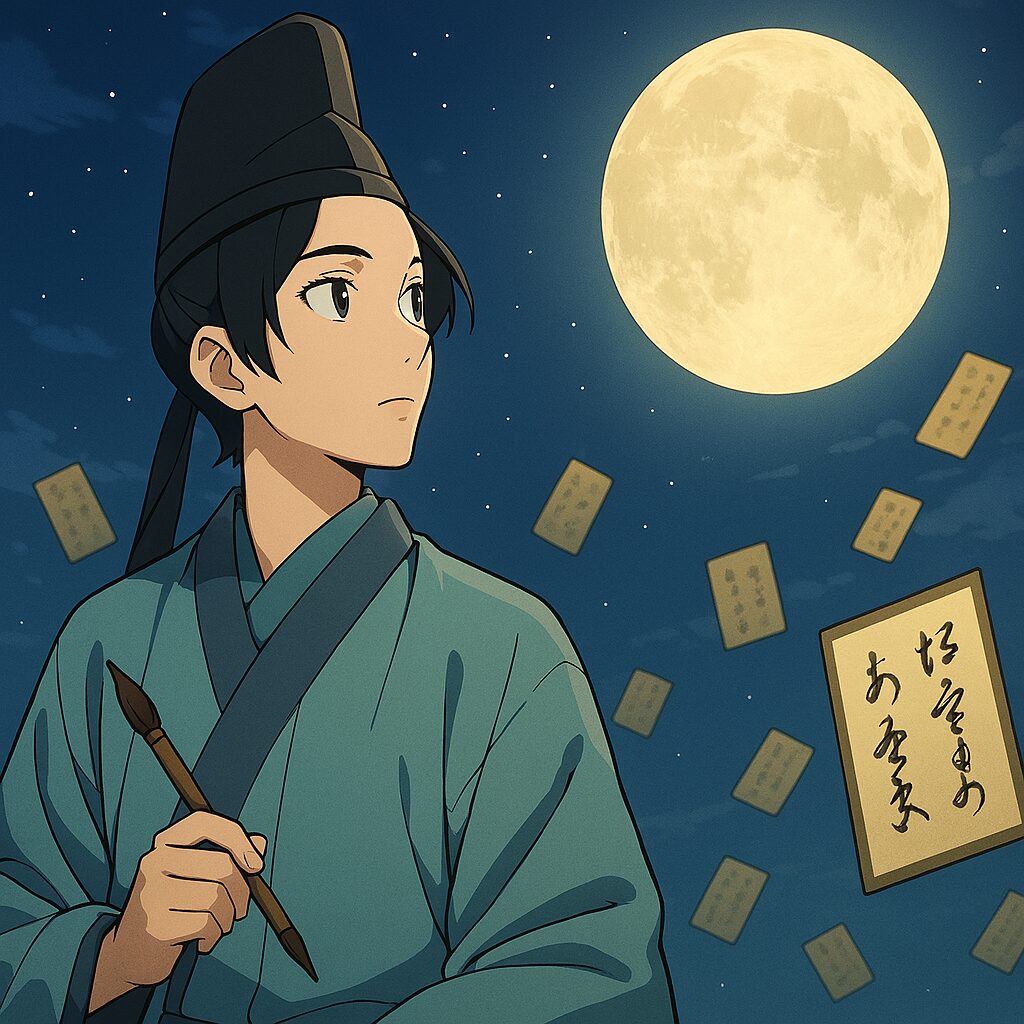— A Journey Through Words, Memory, and Emotion Across Centuries
🏮 Introduction: Why Remember Teika Today?
August 20th marks “Teika Memorial Day” in Japan—the anniversary of the death of Fujiwara no Teika, a revered poet of the Kamakura period. He is best known for compiling the Ogura Hyakunin Isshu, a collection of 100 classical Japanese poems that continue to resonate deeply with the Japanese soul.
But what exactly is Hyakunin Isshu? Who was Fujiwara no Teika? And why do these ancient poems still matter today?
This article invites readers—especially those unfamiliar with Japanese culture—into the poetic universe Teika helped shape. It’s a journey through language, emotion, and memory that transcends time and borders.
- 👤 Who Was Fujiwara no Teika? A Poet Who Wove Memory into Words
- 📜 What Is Hyakunin Isshu? 100 Hearts, 100 Lives
- 🎴 More Than Literature: A Game, A Tradition, A Cultural Bridge
- 🌍 Why Share This With the World? Emotion Beyond Language
- 🖋 On Teika Memorial Day: Words That Outlive Time
- 【今日は何の日】定家忌と百人一首:千年の感情を編む、言葉の宇宙へ
- 🏮 はじめに:今日という日に、なぜ定家を想うのか
- 👤 藤原定家とは?記憶と感情を編む詩人
- 📜 百人一首とは?100人の心、100の人生
- 🎴 百人一首は遊び?教育?文化の継承?
- 🌍 なぜ世界に伝えたいのか?言葉の向こうにある感情
- 🖋 定家忌に寄せて:言葉は記憶を超える
- 🍵 あとがき:言葉に宿る、千年のぬくもり
👤 Who Was Fujiwara no Teika? A Poet Who Wove Memory into Words
Fujiwara no Teika (1162–1241) was a nobleman, scholar, and poet who lived during Japan’s Kamakura period. He mastered the art of waka—a traditional Japanese poetic form consisting of 31 syllables—and used it to express the fleeting beauty of nature, love, and life itself.
Teika’s poetry wasn’t just elegant—it was emotionally charged and deeply philosophical. He saw poems as crystallized emotions, and his legacy lives on in both his writings and his editorial work.
Among his greatest achievements is the compilation of Ogura Hyakunin Isshu, a poetic anthology that continues to shape Japanese cultural identity.
📜 What Is Hyakunin Isshu? 100 Hearts, 100 Lives
Ogura Hyakunin Isshu is a curated collection of 100 poems by 100 different poets, each expressing a unique emotional moment. Think of each poem as a “poetic business card”—a brief but powerful glimpse into the poet’s soul.
Here’s one example:
Kore ya kono / yuku mo kaeru mo / wakarete wa / shiru mo shiranu mo / Ōsaka no seki — Semimaru
Translation: Here at the Ōsaka Barrier, people part ways—some known, some strangers—each on their own journey.
This poem captures the bittersweet nature of human encounters: meetings, partings, and the quiet mystery of connection. It’s a theme that resonates across cultures and centuries.
🎴 More Than Literature: A Game, A Tradition, A Cultural Bridge
Hyakunin Isshu is not just a literary treasure—it’s also a beloved cultural tradition. In Japan, it’s played as a card game called karuta, especially during New Year celebrations.
Players compete to quickly identify and grab the correct poem card after hearing its first few lines. It’s a test of memory, reflexes, and emotional intuition.
For international readers, it can be introduced as a “poetry memory game”—a fun and educational way to engage with classical literature. English translations and adaptations have made Hyakunin Isshu increasingly accessible worldwide.
🌍 Why Share This With the World? Emotion Beyond Language
The true beauty of Hyakunin Isshu lies in its emotional universality. Though written in classical Japanese, the themes are timeless:
- The ache of love
- The solitude of longing
- Reverence for nature
- The sorrow of farewell
These are feelings shared by all cultures. Whether through English poetry, French chansons, or Persian ghazals, the emotional core remains the same.
Teika’s poems speak across centuries, offering a kind of “emotional translation” that transcends language.
🖋 On Teika Memorial Day: Words That Outlive Time
Today, on Teika Memorial Day, why not pause and listen to the voice of a poet from a thousand years ago? In just 31 syllables, he captured emotions that still stir the human heart.
Hyakunin Isshu is more than a collection of poems—it’s a bridge between past and present, between Japan and the world. And Teika Memorial Day is the perfect moment to cross that bridge.
【今日は何の日】定家忌と百人一首:千年の感情を編む、言葉の宇宙へ
〜藤原定家と和歌がつなぐ、記憶と心の旅〜
🖼 アイキャッチ画像案
- アニメ風の藤原定家が月を見上げるシーン(和装・筆を持つ)
- 背景に百人一首の札が舞う幻想的な構図
- タイトル文字:「定家忌と百人一首|千年の感情を編む言葉の宇宙」
🏷 カテゴリー・タグ(WordPress用)
- カテゴリー:日本文化、今日は何の日、和歌
- タグ:藤原定家、百人一首、定家忌、和歌、かるた、日本の伝統、文化紹介、国際読者向け
🏮 はじめに:今日という日に、なぜ定家を想うのか
8月20日。日本ではこの日を「定家忌」と呼びます。 鎌倉時代の歌人・藤原定家の命日であり、彼が編んだ『小倉百人一首』は、今もなお日本人の心に生き続けています。
でも、百人一首って何? 藤原定家って誰? 和歌って、そんなに特別なの?
この記事では、日本文化に馴染みのない海外の読者にもわかりやすく、定家と百人一首の魅力を紐解いていきます。 それは、言葉を通して感情を編み、記憶を残すという、人間の本質に触れる旅でもあります。
👤 藤原定家とは?記憶と感情を編む詩人
藤原定家(ふじわらのていか)は、12〜13世紀に活躍した貴族であり歌人。 彼は、自然や恋、人生の儚さを、たった31音で表現する「和歌」の名手でした。
定家の和歌は、単なる言葉遊びではありません。 それは、感情の結晶であり、記憶の保存装置でもあります。
彼は日記『明月記』を残し、天体観測や政治の記録も綴りました。 しかし何よりも、彼の功績は『小倉百人一首』の編纂にあります。
📜 百人一首とは?100人の心、100の人生
『小倉百人一首』は、定家が選んだ100人の歌人による和歌集。 各歌は、たった一首でその人の人生や感情を語る「詩的な名刺」のようなものです。
たとえば、こんな歌があります:
これやこの 行くも帰るも 別れては 知るも知らぬも 逢坂の関 — 蝉丸(せみまる)
意味:ここが逢坂の関か。行き交う人々が別れ、出会う場所。知っている人も知らない人も、人生の交差点で出会う。
この歌には、人と人とのすれ違い、出会い、別れが凝縮されています。 まるで現代の駅や空港のような、人生の通過点を詠んでいるのです。
🎴 百人一首は遊び?教育?文化の継承?
百人一首は、単なる文学作品ではありません。 日本では「かるた」として遊ばれ、記憶力・集中力・感性を育てる教材にもなっています。
特に正月には、家族や学校で百人一首大会が開かれます。 札を取り合うスピードと記憶力の勝負。 でもその根底には、言葉を通じて感情を共有する文化があるのです。
海外の読者にとっては、「詩を使った記憶ゲーム」として紹介すると親しみやすいでしょう。 実際、英語訳された百人一首も出版されており、国際的な注目も高まっています。
🌍 なぜ世界に伝えたいのか?言葉の向こうにある感情
百人一首の魅力は、言語を超えて人間の普遍的な感情を伝える力にあります。
- 恋の切なさ
- 孤独の深さ
- 自然への畏敬
- 別れの痛み
これらは、どの文化にも共通するテーマです。 たとえば、英語の詩やフランスのシャンソンにも、似たような感情が込められています。
定家の和歌は、千年前の感情が、現代の私たちに語りかけてくるような力を持っています。 それは、文化を超えた「心の翻訳」なのです。
🖋 定家忌に寄せて:言葉は記憶を超える
今日という日に、定家の歌に耳を傾けてみませんか。 たった31音の中に、千年の感情が息づいていることに気づくはずです。
百人一首は、過去と現在、そして国境を越えて人をつなぐ「言葉の橋」。 定家忌は、その橋の起点となる日なのです。
📣 まとめ:文化は感情の記憶装置
藤原定家と百人一首は、日本文化の中でも特に「感情の記憶」に焦点を当てた存在です。 それは、言葉を通して人をつなぎ、時代を超えて心を動かす力。
この記事が、海外の読者にとっても「日本文化の入り口」となり、 そして日本人にとっても「自分の文化を再発見するきっかけ」となれば幸いです。
🍵 あとがき:言葉に宿る、千年のぬくもり
藤原定家が編んだ百人一首は、単なる古典ではありません。 それは、人間の感情を言葉に託し、時を超えて伝える装置です。
現代の私たちは、SNSやメッセージアプリで日々言葉を交わします。 でも、ほんの一瞬で流れてしまう言葉の中に、どれだけの感情が残っているでしょうか。
百人一首の和歌は、たった31音で、忘れたくない感情を記憶に刻む試みです。 それは、誰かを想う気持ち、自然に心を動かされた瞬間、別れの痛み、そして人生の儚さ。
定家忌にあたる今日、そんな言葉の力にもう一度目を向けてみませんか。 千年前の歌人が残した言葉が、今のあなたの心にそっと触れるかもしれません。



コメント